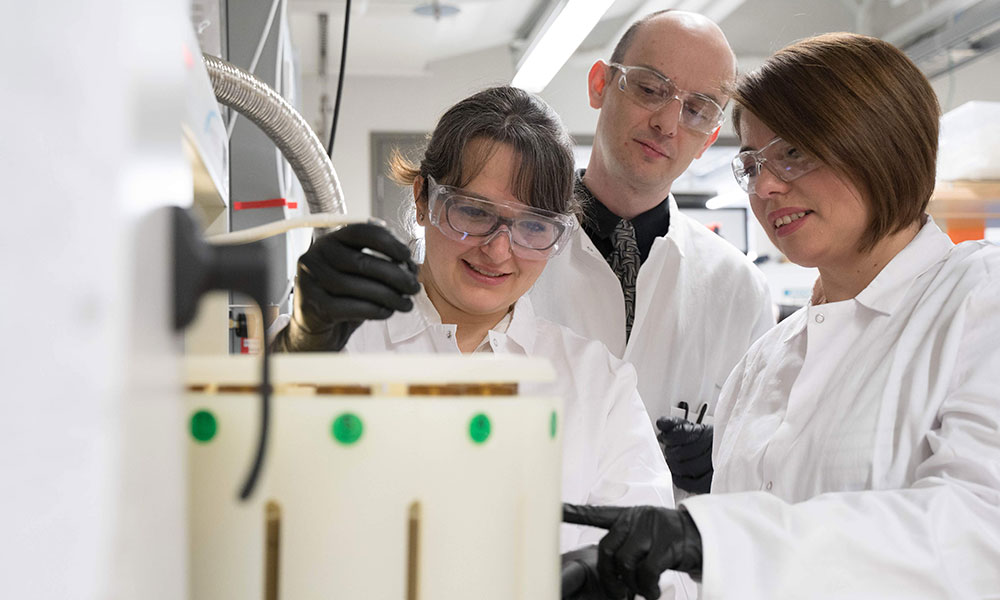Faculty Profile, People
Civil engineering researcher Cigdem Eskicioglu explores solutions to environmental pollutants
May 26, 2020

About
Name
Cigdem Eskicioglu
Role
Professor
Program
Civil Engineering
School
Engineering
Faculty
Applied Science
Campus
Okanagan (Kelowna, BC)
Education
PhD (Environmental Engineering) University of Ottawa
PhD (Environmental Engineering) University of Ottawa
BSc (Environmental Engineering) Istanbul Technical University
Hometown
Istanbul, Turkey
“My interest in environmental issues came from my own firsthand experiences with traffic jams and lack of clean water and air, which most of us here in Canada take for granted.”
ONE OF THE FIRST THINGS MOST PEOPLE NOTICE when entering the UBC Bioreactor Technology Laboratory is the smell. Although technicians are usually quick to apologize for it, the pungent aroma has a purpose: the lab’s bioreactors are working hard to process waste and biologically treat materials to remove micro and nano pollutants.
What initially starts as organic waste – including varying levels of natural and man-made pollutants like hormones and pharmaceuticals – is eventually transformed through biological treatments into bioenergy and fertilizer.
The research is led by Cigdem Eskicioglu, a professor and Industrial Research Chair in Advanced Resource Recovery from Wastewater. In partnership with the Natural Sciences and Engineering Research Council of Canada (NSERC) and Metro Vancouver, the research is transforming wastewater facilities into product factories, minimizing waste, creating carbon credits and leading a new circular economy.
Born in Turkey, Eskicioglu spent 10 years in Istanbul, one of the most beautiful, historical metropolitan cities in the world. But it’s a city that also has vast environmental concerns.
“My interest in environmental issues came from my own first-hand experiences with traffic jams and lack of clean water and air, which most of us here in Canada take for granted,” says Eskicioglu.
She witnessed the consequences of migration, population growth, deforestation, slow development of public transportation, and industrial air and wastewater pollution from power plants, metallurgy, cement, sugar, leather processing and textile factories.
RESEARCH FOCUS
Eskicioglu made it her mission to make a difference: “I’m passionate about discovering knowledge in the laboratory and sharing it in the classroom,” she says.
“I help graduate and undergraduate students understand that it takes very little effort to contaminate the environment, and a tremendous amount of time, effort, innovative technology and resources to make it safe again.”
Her research focuses on biological waste treatment processes, in particular anaerobic digestion, which can utilize microorganisms to turn organic waste into renewable energy (methane) and organic fertilizer. Eskicioglu also works to identify and remove emerging micropollutants like hormones, pharmaceuticals and pesticides.
Eskicioglu collaborates with many government agencies, municipalities, industries and researchers within UBC and other institutions, with the ultimate goal of waste reduction and resource recovery. The group operates three facilities: the Advanced Anaerobic Digestion Facility; the Particle Sizing, Zeta Potential and Imaging Facility; and the Micropollutant Detection Facility.
Partnering with local municipalities and utilities, Eskicioglu explores waste-to-energy options, waste minimization, resource recovery and odour-reduction solutions.
Her interest in emerging micropollutants developed while she was a graduate student at the University of Ottawa.
“Since most of the conventional wastewater treatment plans are not able to efficiently remove micropollutants, I believe that advanced treatment processes designed to target these micropollutants are urgently needed.”
Eskicioglu’s research bridges multi-disciplinary and academic boundaries in the pursuit of making the world a cleaner and more sustainable place. In recognition of her work, which has made a significant contribution to research on the UBC Okanagan campus, across Canada, and around the world, Eskicioglu was recognized as the 2020 UBC Okanagan Researcher of the Year (NSERC category).
LOCAL & GLOBAL COLLABORATIONS
Fuelled by the province’s CleanBC energy plan for reducing greenhouse emissions and meeting renewable-energy requirements by 2020, industries and municipalities are seeking waste-to-energy solutions. These increasingly stringent disposal regulations are spearheading the re-thinking of waste-management strategies.
“In just over a decade,” Eskicioglu says, “we’ve been able to develop strong partnerships with many local municipalities and utilities to explore their waste-to-energy options, waste minimization and odour reduction. For example, our research group conducted extensive bench-scale anaerobic digester testing programs for conversion of City of Kelowna and Regional District of Central Okanagan’s municipal biosolids to biogas and fertilizer. Some of our conceptual solutions are now being further considered by consulting design teams for pending facility upgrades.”
Similar challenges – and therefore motivation – exists globally as well. For this reason, UBC’s Bioreactor Technology Group has been attracting many visiting scholars from other institutions around the world, including Istanbul Technical University in Turkey, IIT in India and ENSIL in France.
During a recent study leave, Eskicioglu collaborated with the Laboratory of Environmental Biotechnology, a research unit of the National Institute for Agricultural Research in Narbonne, France, and the Group of Environmental Engineering and Microbiology (Polytechnic University of Catalonia) in Barcelona, Spain.
“I’m so proud of the accomplishments that our group has achieved to date,” says Eskicioglu, “and I can’t wait to see what innovations we uncover in the future.”
